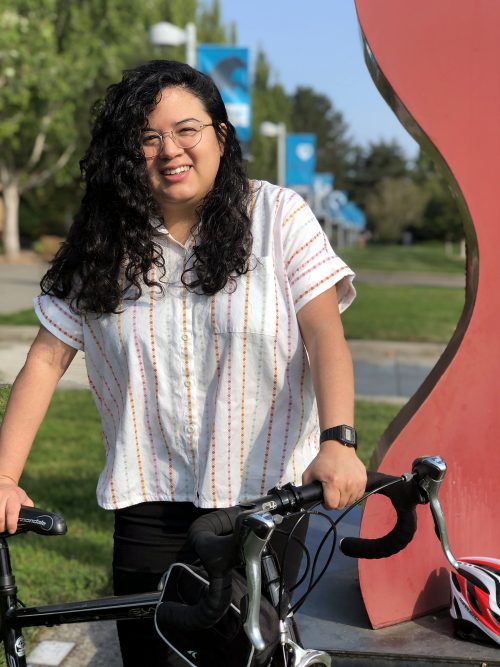This content was published: December 20, 2021. Phone numbers, email addresses, and other information may have changed.
Advisor Andrea Reyes discusses how she supports equitable student success
Photos and Story by Amy Corliss
Yes to Equitable Student Success (YESS) has been PCC”s roadmap to dismantling barriers and building inclusive systems of education and support. Hundreds of faculty, staff and administrators have served on and contributed to YESS work teams over the past four years in order to analyze its current systems and practices and recommend meaningful improvement. These efforts informed the development of our 2020-25 Strategic Plan and organizational restructure.
The Academic and Career Pathways (ACP) Implementation Design Process is an impactful example of how teams have come together across departments and divisions to implement and carry this work forward. A dedicated team of nearly 140 staff and faculty participated in a unique collaborative process throughout the 2020-21 academic year. Meeting regularly with cross-functional teams, they were able to identify critical recommendations to inform the Pathways design.
Andrea Reyes is a CTE advisor for Business and Applied Technology who served as co-lead for the Pathway Advisor and Business and Entrepreneurship teams during the ACP Implementation Design Process, one of many teams that have supported the college’s Yes to Equitable Student Success (YESS) work.
She shared her experience on the teams and how she supports equitable student success through advising:
“YESS is really all about student success. I’ve heard it defined in a variety of ways, but for me, student success is about giving students the tools they need to meet their goals. The YESS work is heavily focused around equity and inclusion, using data to understand which students are dropping out and why, and what strategies we can put in place to eliminate disparities.
As an advisor, and former PCC student myself, I knew that I had to be part of the YESS work in some way to help in these efforts. In 2019, while I was working on my master’s in Leadership and Education Policy, I learned about an opportunity to co-lead the Business & Entrepreneurship team in the Academic and Career Pathways Implementation Design Teams. I was so excited and surprised that my application was accepted because I was relatively new compared to others on the team. I thought, “Nobody even knows my name here yet!”, as impostor syndrome kicked in. But everyone has been incredibly supportive as we learned and developed a process together, which really helped me feel like I belong and my contributions matter.
Over the past year and a half, each implementation team had regular meetings to examine college processes and how they could be more equitable. An important part of the ACP work was also ensuring that all of our meetings were grounded in equity and inclusion. There were 20 different teams made up of people from across all divisions and departments to break down silos and ensure there were minimum standards for student success across all college areas and pathways. Working on the ACP Design Teams made me take a step back and look at what we’re really doing together as a college. This isn’t just a pathway thing but a way we’re going to change the way students get supported at PCC.
Advising Redesign is one of the excellent initiatives that has come out of the YESS work so far. We know from data that students are more likely to stick with college if they have someone who can guide them — we have to give students clear guidance to persist. Before, there was a gap between the advisor and the student. Students didn’t have an advisor assigned to them, and they’d sometimes have to wait up to two hours in line for an advisor they didn’t even know. Advising Redesign has changed this. Now, all students get an assigned advisor who will take the time to get to know them and to understand their academic and career goals.
The whole experience of advising has changed for me, too. What excites me most about this work is the technology we’ve been using. We’ve got a new online platform called EAB that we use to connect with students. We reach out to them during the term to show them how to access the platform so they can reach us more directly and make appointments with us whenever they want. It also allows us to run student data reports that weren’t available before. We’re continuously improving, especially when it comes to collecting data on students’ needs.
The feedback I’ve gotten from students so far has been really positive. I recently worked with a student who was on academic probation to get their GPA back up and to help them be more strategic about choosing classes. I was impressed with their engagement; they really paid attention and applied what I taught them, and they were grateful for the guidance. When I’m advising, I want to teach my students how to be successful on their own. If they need my help I’ll hold their hand, but mostly I want to teach them how to do it sustainably themselves. It’s like the saying: “Give a person a fish and you feed them for a day. Teach a person to fish and you feed them for a lifetime.”
“We’re changing the way that we’re thinking about student success and student support, and I think it’s awesome we’re not siloed anymore. I hope Advising Redesign and the other YESS work helps our students feel like they have the support they need. There are people at PCC who care for them, and really want them to succeed.”
-Andrea Reyes
